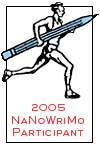The Unamerican Activities Committee is back--and it's automated
From this debacle, the Pentagon learned that if you are going to implement a Gestapo- or Kremlin-like dossier of your citizens' activities, you don't make it public. TIA was dismantled, and its core components renamed and spread out among other agencies. Now New Scientist has learned one of these renamed components has been reactivated. This one will scavenge and compile all of your online postings and identify relationships between you and everyone else you come in contact with on the web:
...the NSA is pursuing its plans to tap the web, since phone logs have limited scope. They can only be used to build a very basic picture of someone's contact network, a process sometimes called "connecting the dots". Clusters of people in highly connected groups become apparent, as do people with few connections who appear to be the intermediaries between such groups. The idea is to see by how many links or "degrees" separate people from, say, a member of a blacklisted organisation.
...
No plan to mine social networks via the semantic web has been announced by the NSA, but its interest in the technology is evident in a funding footnote to a research paper delivered at the W3C's WWW2006 conference in Edinburgh, UK, in late May.
That paper, entitled Semantic Analytics on Social Networks, by a research team led by Amit Sheth of the University of Georgia in Athens and Anupam Joshi of the University of Maryland in Baltimore reveals how data from online social networks and other databases can be combined to uncover facts about people. The footnote said the work was part-funded by an organisation called ARDA.
What is ARDA? It stands for Advanced Research Development Activity. According to a report entitled Data Mining and Homeland Security, published by the Congressional Research Service in January, ARDA's role is to spend NSA money on research that can "solve some of the most critical problems facing the US intelligence community". Chief among ARDA's aims is to make sense of the massive amounts of data the NSA collects - some of its sources grow by around 4 million gigabytes a month.




